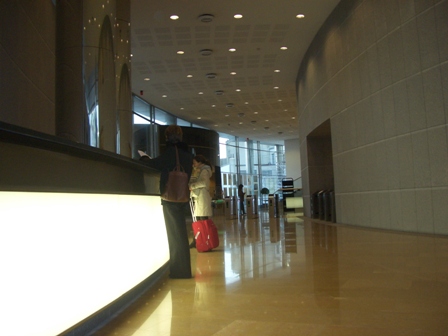European Commission

DG Education and Culture building
Entry or exit points are the revolving doors of main buildings housing the various DGs. Yet this metaphorical reference should not suggest everyone comes and goes since the European Commission values a continuity and seeks to ensure that its staff works until retirement age has been reached. Naturally the upper echelons, and especially those linked to Commissioners depend upon the duration of the Commission till the next election of the President and all Commissioners. There will be a novelty in 2014 since then the European Parliament shall elect for the first time the Commissioner. Until now it was done by appointment by the Member States. Always the question has been whether or not the member states wished for a strong or weak President as this would allow them to have a certain political leeway. Since Delors was President, there has not been anyone like him who could articulate and sustain the European idea. Santer, Prodi and Barrosso followed particular agendas and proved to be effective in only a very limited sense. Santer had to depart as well due to a financial scandal linked to DG XXII (at that time). The changes since 1999, along with the reform efforts undertaken by Kinnock under Prodi, meant drastic changes within the EU Commission with the outcome being that mainly the most competent ones who had set-up and operated successful funding programs were removed from their posts and if not directly ousted, delegated to fields outside their natural competences. This has hurt more than anything else the Commission and its ability to stay in contact with people engaged at project level with advancing the idea of Europe. There have been many more fault lines with the ethical vision all but gone due to succumbing ever more to pressures exerted if not by member states, then by corporations and powerful interest groups. The unresolved nature since the EU Constitutional Treaty was not ratified in 2005 left as well all EU institutions without moral legitimacy, and that has been hurting all along the EU Commission as well as the EU Parliament. The economic crisis since 2009 has sidelined ever more the European Parliament although it is being inflated in terms of people being hired there due to the supposed increase in power as given to the EU Parliament by the Lisbon Treaty. At the same time, the EU Commission has sought to increase its power while handling the crisis in a way as exemplified by the TROIKA so that the World Bank as an outside force has ever more influence upon what citizens in Europe have to face without knowing fully what are the multiple causes of this crisis. The unresolved nature of this self appointed political executive makes the European Commission to be the equivalent of a government while it is acting only by power being decreed to it insofar as single member states are unable to do the same job. This has always been the main argumentation and thus the line of political adaptation runs completely counter to the need for Europe to go through quite another cultural adaptation if it is to combine all resources, in order to bring about democratic governance.
HF 25.8.2013
Corridors of power - a brief comment
DG Education and Culture
It is possible to make reference to the gap between citizens and EU institutions, as does Juergen Habermas, in his book "Ach, Europa" (2008) to the risk for any citizen to get lost in the corridors of seeming or anonymous power. However, it has to be said that the European Commission appears at first hand to most people who start to interact with parts of the Commission, that its staff is mostly unpretencious and quite open for questions, that is more accessible when compared with bureaucrats of many national, regional and local administrations.
But for anyone having the courage to approach simply off the street someone working for the European Commission, there must be found some keys for entry. One of them has to be to know at least someone working within the Commission so that the anonymous body of high ranking European civil servants takes on a familiar face. But that is not all. It takes some socialization in European projects to know how things are structured and why it would be false to speak of European civil servants. They are much more political while working directly in the knowledge that they are doing things for Europe.
« Debate in CULT about culture and structural funds - the KEA study (2012) | Reform of the Commission 2000 »


